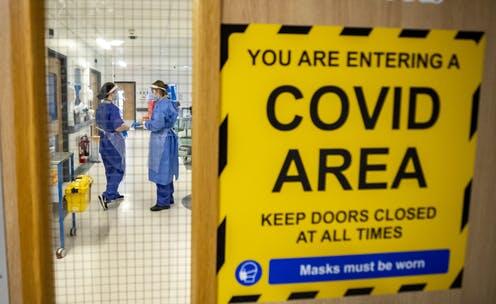
LSTM’s Professor Miriam Taegtmeyer (Professor of Global Public Health) and Dr Tom Wingfield (Senior Clinical Lecturer) have, today, published an article that shines a light on the impact the COVID-19 pandemic has had on frontline healthcare workers and the wider healthcare system.
The article, published in The Conversation, is a follow-up to their earlier piece in April 2020, during the first wave of Covid-19, which addressed the early days of the pandemic when our health systems were weighed down by inadequate communication, PPE shortages and testing limitations. That article also highlighted the need to plan ahead for the likely second wave of the pandemic will be upon us .
We are now going through a second wave of coronavirus in the UK. Liverpool has been at the forefront of this wave, seeing a dramatic rise in cases since September. Indeed, the numbers of hospital admissions for COVID-19 were higher than during the first wave.
Professor Taegtmeyer and Dr Wingfield’s article explores how healthcare workers continue to put their lives and those of their families on the line. Despite the challenges with staff shortages and mourning the wider loss of healthcare worker colleagues, Dr Wingfield said that during this second wave he has seen: “the inherent resourcefulness of NHS healthcare workers. In Liverpool, genito-urinary medicine and palliative care specialist colleagues have expanded their care to cover or lead COVID-19 wards. Other hospital doctors have upskilled to look after people needing ventilators. What is unclear is how long we can keep stepping up.”
As time moves on there are glimmers of hope and the situation is improving. Professor Miriam Taegtmeyer said: “There have been huge steps forward in our understanding of COVID-19. Indeed, scientific progress has been so fast that it is hard for frontline healthcare workers to keep abreast of developments. Multiple vaccine studies have shown promising efficacy and safety results . We are proud in Liverpool to have been a major recruiter to the Oxford vaccine trial, which has also shown highly favourable interim results.”
Both Professor Taegtmeyer and Dr Wingfield concluded by looking to the future and the need for transparent and meaningful public debate between multiple sectors about the health, economic, and social trade-offs because of the implementation of COVID-19 policies. Crucially they emphasized the importance of trust and forgiveness between healthcare workers, NHS leaders and government during this difficult and challenging time. Finally, they underlined their first-hand experience that “the care that patients receive and the outcomes of people with COVID-19 have improved. It is a joyful feeling to see those affected walk out of hospital. Nearly eight decades after it opened, the NHS remains here for those who need it. Thankfully, that’s one thing that COVID-19 won’t change.”